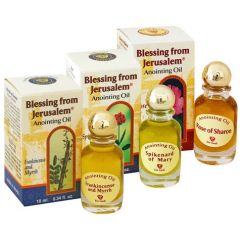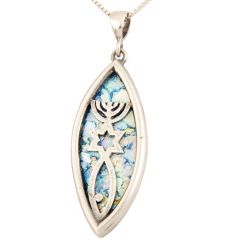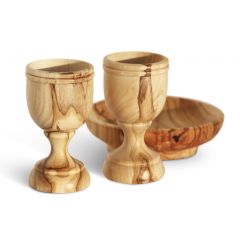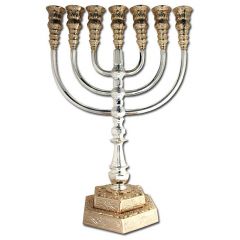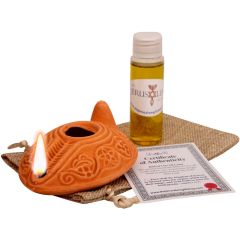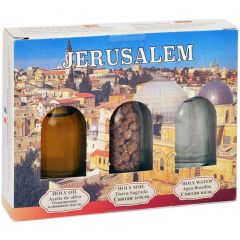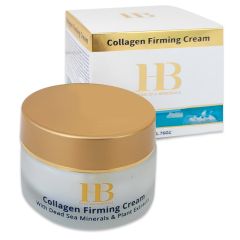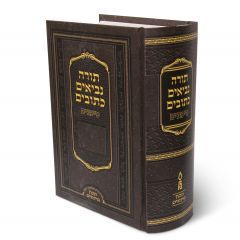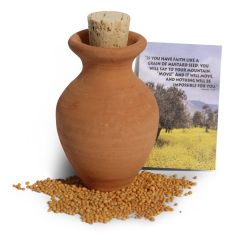We use cookies to improve your experience on our site and to show you relevant advertising.
To find out more, read our updated privacy policy and cookie policy. Read more
Anointing Oil
Holy anointing oil

When Esther was getting ready to meet King Xerxes, using oil of myrrh was one of the main techniques prescribed as preparation for this bride-to-be. Similarly, we can view our application of biblical anointing oil as key to our preparation for meeting with the KING of KINGS – a significant step we take as we are paving the way for Him to move in our presence.
The Bible teaches us about the use of holy anointing oil as a symbol of GOD’s ability to bring about a number of essentials for our wellbeing and salvation, including healing (Mark 6:13), consecration (Exodus 30; Leviticus 8:10-13), breaking bonds (Isaiah 10:27) and deliverance (Mark 6:12-13), to name a few.
In particular, James 5:14-15 illustrates that anointing oil, applied in faith, is a powerful weapon against a spiritual attack of the enemy, which can translate into a disease designed to destroy the body:
“Is any sick among you? let him call for the elders of the church; and let them pray over him, anointing him with oil in the name of the LORD: And the prayer of faith shall save the sick, and the LORD shall raise him up; and if he have committed sins, they shall be forgiven him.” (KJV)
Have you applied this Biblical prescription as a means of opening the gates for the KING to enter and move where you have need of healing, sanctification or deliverance? We are seeing an increase in miraculous healings within congregations that embrace the significance of biblical anointing oil and have received numerous testimonies throughout the years of GOD working a medically impossible feat through believers that used anointing oil for healing. When we step out in faith in the natural, GOD secures victory in the supernatural.
We would likewise love to know your testimony! Please contact us and share it with us here.
How is holy anointing oil used?
One of the most important things to know about anointing oil, is that it is GOD who bestows the power. There is no power in the oil itself, although it has been made holy. It has no power apart from GOD. We serve a miracle-working GOD, not miracle-making objects.
‘Anointing’ is a verb meaning to smear or rub with oil. To consecrate – set apart as holy – a person, place or object to GOD. We should anoint anything we chose to submit under the authority of the LORD, starting with your own person, as well as your territory. This would typically include your property, your home, work place, even articles inside of these buildings. Exodus 40:9 illustrates: “And you shall take the anointing oil, and anoint the tabernacle, and all that is in it, and shall hallow it, and all its utensils: and it shall be holy.” (KJ2 2000)
Biblical anointing oil is typically applied to the area you aim to bless. Anointing is often done by applying a small amount of oil with a finger to the forehead, or any place that represents the area which you desire GOD to touch. The forehead would be symbolic of cleaning your mind of unwanted thoughts, but you may want to anoint the area above your heart as the origin of emotions etc. Holy anointing oil can also be applied to those parts of the body that are under attack, such may the case with a specific illness.
We find the first reference to biblical anointing oil in Genesis 28:10-22: After the ALMIGHTY appears to Jacob in a dream, Jacob anoints a stone pillar by pouring oil over it and makes a vow of commitment to GOD. Jacob names the place Beit-EL, meaning ‘House of GOD’. A Scriptural example of how we can claim an area unto the ownership of our GOD.
Furthermore we see in biblical context, that the use of holy anointing oil was symbolic of GOD’s approval. In 1 Samuel 10:1, Samuel anoints Saul to become king: “Then Samuel took a vial of oil, and poured it upon his head, and kissed him, and said, Is it not because the LORD has anointed you to be ruler over HIS inheritance?” (KJ2 2000) Also in verse 9: “…GOD changed Saul’s heart…” (NIV)
For us, there is no way to hold GOD’s approval without YESHUA. In both 2 Corinthians 1:21-22 and 1 John 2:20&27 we learn how we are anointed in CHRIST and that the HOLY SPIRIT remains with us as our TEACHER. At the core of everything we have and do in GOD, lie our salvation in YESHUA. As we anoint, these are some of the fundamental things we are symbolizing: That we associate with our identity in the SAVIOUR, cover ourselves with HIS grace, mark ourselves for HIS blessing, pour HIS presence out over us and choose HIS guidance for us.
Many users of holy anointing oil note that the special fragrance remains with them for hours following the act of anointing. It is a physical reminder of the fact that we have submitted ourselves to GOD, a lingering token of our special meeting with the ALMIGHTY in a world dead-set to keep us from HIS presence.
Ask the HOLY SPIRIT to lead you in terms of anointing – who, where and how to anoint. It is after all, the activation of HIS power and we want it to flow as HE pleases.
When should holy anointing oil be used?
Anointing should be part of our continual interaction with the FATHER – as we move through our days accumulating the ‘filth’ of the world, it’s always advisable to return to our ‘FIRST LOVE’ and reestablish our dedication to GOD by purifying ourselves unto HIM afresh. Anoint yourself as part of your quiet time with GOD, prior to studying scripture, praying or fasting. Anointing items you use often, as well as objects of worship, such as your prayer shawl is good practice.
Consecrating your home is prescribed in the Bible as such: “And the officers shall speak unto the people, saying, What man is there that has built a new house, and has not dedicated it? let him go and return to his house, lest he die in the battle, and another man dedicate it.” (Deuteronomy 20:5, KJ2 2000) Thus dedication of a new home, but also recurrent dedication of a home we have been living in for years, since visitors or even ourselves as inhabitants can bring in the presence of unholy and unwanted things.
You can also anoint another person. Ideally in their presence, and with their agreement; but even anointing the objects they come into contact with has its value – such as their pillows to carry the fragrance of GOD during the night, their vehicles etc. (May it then only be as a symbol that you dedicate that person to the LORD, for instance a mother dedicating her child to the will of GOD.)
Since husbands are the priests of the household, anointing their families is a great opportunity for them to confer blessings.
Anointing should be done when under spiritual attack – to counter illness, emotional disturbance or oppression. “And they cast out many demons, and anointed with oil many that were sick, and healed them.” (Mark 6:13, KJ2 2000)
Anointing oil in the Bible
The Bible provides powerful examples of how holy anointing oil is used to achieve the purposes of GOD, some of which have been discussed above. Other prominent applications include warfare: “…anoint the shield.” (Isaiah 21:5, KJV), referring to the custom of oiling the leather shield in order to make it supple when used in battle. Similarly, when we prepare for spiritual warfare, anointing oil should be applied to get our ‘shield of faith’ battle-ready.
Anointing as a means of hospitality was a custom exercised by pouring and massaging perfume or oils onto the head, hands and feet of travelers as you welcomed them into your home. Luke 7:36-50 tells the story of the sinful woman wetting the LORD’s feet with her tears, wiping them with her hair and then anointing them with oil. The deep need she expressed for her SAVIOUR is clearly the preferred way to invite CHRIST in, contrasted here with the seemingly more deserving life that Simon led.
David anoints himself after repentance and as part of cleansing himself prior to worshipping GOD in 2 Samuel 12:20: “Then David arose from the earth, and washed, and anointed himself, and changed his apparel, and came into the house of the LORD, and worshipped…” (KJV). Following his repentance, the LORD gave him another son with Bathsheba, the great King Solomon or Jedidiah (‘the beloved of Yah’).
In Ruth 3:3 Naomi advises her daughter-in-law as follows: “Therefore wash yourself, anoint yourself, and put on your clothes, and go down to the threshing floor…” (NHEB). Ruth asks Boaz for his covering and she goes on to become the Moabite widow who was grafted into the lineage of CHRIST. Anointing is featured here as a means of adornment, but surely also a symbol of the bride of CHRIST preparing herself for her SAVIOUR and BRIDEGROOM.
How is Biblical anointing oil made?

At the Jerusalem Gift Shop, all our anointing oils are made using virgin olive oil from the Galilee region of the Holy Land. This anointing oil from Israel is made from olives harvested from trees that grow in the places where YESHUA taught.
The oil is made holy by means of prayer. Again, as mentioned above, the oil in itself is merely a means of conveying GOD’s power according to HIS prescription.
All of our anointing products do not only originate from the Holy Land, but are also made in Israel using pure olive oil blended with the original scents from the Bible. A handful of them are discussed below:
Myrrh: Used for purification during bridal preparation (Song of Solomon 1:13) and prior to the coronation of a queen (Esther 2:12), symbolic of dying to self and the bride preparing for the KING. Myrrh was also given to the MESSIAH at the end and beginning of HIS life on earth.
Frankincense: Both frankincense and myrrh have significant healing abilities. Frankincense was used in the temple on the Altar of Incense and given to CHRIST as a baby alongside myrrh and gold, believed to be significant of HIS priestly role.
Rose of Sharon: A reference to the ‘Beloved’ (Song of Solomon 2:1). Symbolizing the potential of beauty flowering in harsh, unfavorable circumstances.
Lily of the valley: Purity of heart (Song of Solomon 2:1-2).
Spikenard: The costly, fragrant oil Mary used to anoint the MESSIAH’s head and feet prior to the cross. (Symbolic of intimacy with the BRIDEGOOM, praise and worship.)
Cassia: Symbolic of dedication and devotion. Cassia is one of the primary spices of the holy anointing oil that was used to anoint priests, kings and their attire.
Cinnamon: Sweet cinnamon is one of the four scents contained in the holy anointing oil which Exodus 30:23 depicts. It is symbolic of holy boldness and passion.
Where to buy anointing oil?
The Jerusalem Gift Shop is the largest supplier of all anointing oil from Israel. We offer a vast selection of the original anointing oil for sale, made from pure olive oil. We are located in Jerusalem, and can ship the anointing oil bottle of your choice to a multitude of countries world-wide.
Our anointing oil from Israel is offered in different bottle formats for your convenience – you may prefer the roll-on anointing oil bottle for easy application.
We go to great lengths to provide the highest quality products, hand picking every item before sending them to our customers.
We are more than happy to assist with any queries you may have regarding anointing oil from Israel, its symbolism and application.





